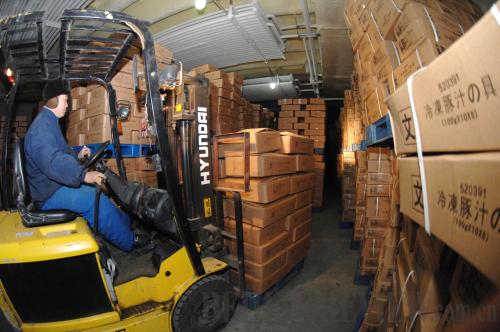|
Impact on China
 |
|
EXPORT BOOM: Products of Shandong Wendong Taishan Food Co. Ltd. to be exported to Japan, which has increased imports from China since the March 11catastrophe that severely hit its agricultural sector (GUO XULEI) |
For China, it is necessary to appropriately estimate the ripple effect of the disaster and have effective countermeasures in place.
First of all, the disaster is expected to depress China's imports and hurt a number of industries. Japan is one of China's largest trade partners, and around 13 percent of Chinese imports come from this Asian neighbor. China now relies on Japan to obtain 13 percent of high-end iron products, 27 percent of key auto parts and most semi-conductor wafers and liquid crystal panels. As a result, the biggest victims will be the automobile, electronics and information industries.
The export outlook will darken in the short term, but longer-term prospect remains bright. Japan has the world's most complicated trade and commerce system. The March 11 earthquake damaged sales networks of retailers ranging from large trading corporations to smaller stores. This obstructed Japan's imports and intensified product shortages in the consumer markets.
But from the long-term perspective, China is bound to benefit from Japan's post-disaster reconstruction. Chinese exporters will therefore bask in the glow of Japan's buoyant demands for agricultural products, construction materials, electrical equipment and daily consumer goods. China's international project contractors will also enjoy torrid growth.
Besides, Japan's earthquake may affect China's campaign to develop renewable energy and slow down growth of the country's nuclear power industry. In 2010, China imported $33.5 billion worth of nuclear reactors, furnaces, and related machinery and parts from Japan, accounting for 22.4 percent of its total imports from the latter.
In the wake of the radiation leakage in Japan, China has initiated a review of its nuclear power safety. It is likely that the nuclear power sector will lose some steam.
Another acute concern lies in imported inflation pressuring asset price surges. The Japanese central bank has adopted quantitative easing policies to maintain domestic financial stability and retain the yen's status as an international currency. But the monetary expansion will surely help force up global commodity prices, adding fuel to inflation jitters in China. Worse still, it will also become a destabilizing force to the capital markets, consumer markets, and the property sector, complicating the Chinese Government's efforts to control house prices.
But the good news is China has gained an opportunity to benefit from industrial relocation. Many Japanese companies have been moving their advanced production lines abroad. Now the nuclear crisis is accelerating that trend. China is positioned to attract those transferred industries and serve as a financial sub-center for the East Asian region. To achieve that, China needs to enhance international financial cooperation and stimulate economic growth and technology development.
Efforts are particularly needed to strengthen research and policy experiments and lay the solid groundwork for Shanghai to become an offshore financial center. It is necessary to coordinate fiscal, monetary and financial policies to build the "Tokyo-Shanghai" financial axis. Meanwhile, the Shandong Peninsula Blue Economic Zone should play a leading role in receiving overseas technology transfers. It would also be helpful if China can become a key link of the global supply chain and press ahead with industry innovations. | 